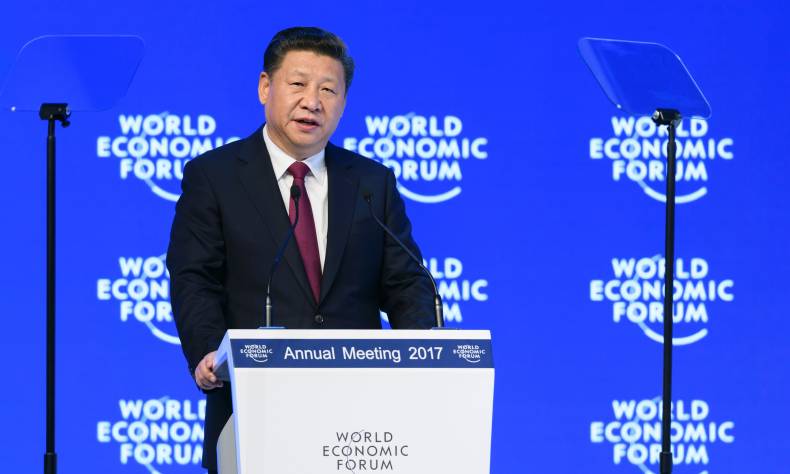
China Opens Door Wider in Contribution to a Community with Shared Future for Mankind
Chinese President Xi Jinping delivered two keynote speeches a year ago in Switzerland, calling for a community of shared future, and achieve win-win development. On January 17, 2017, President Xi Jinping delivered a keynote speech at World Economic Forum annual meeting in Davos. On 18th January, 2017, President Xi Jinping again delivered a keynote speech at the UN headquarters in Geneva. This is a significant and meaningful contribution to global economic governance and to a just new international order.
By Liu Bin
Chinese President Xi Jinping delivered two keynote speeches a year ago in Switzerland, calling for a community with shared future for mankind, and achieve win-win development. On January 17, 2017, President Xi Jinping delivered a keynote speech at World Economic Forum annual meeting in Davos. On 18th January, 2017, President Xi Jinping again delivered a keynote speech at the UN headquarters in Geneva. This is a significant and meaningful contribution to global economic governance and to a just new international order.
Over the past year, in contrast to a growing trend of protectionism, China’s open proposal to build a community of shared future has made a tremendous contribution to economic globalization.
China’s Belt and Road Initiative is a vivid example of regional economic and trade cooperation. China has provided a wealth of public products to countries along the routes, and has created plans to finance infrastructure, e-commerce and development zones through the Silk Road Fund.
The number and value of M&A transactions by Chinese enterprises in countries along the routes has seen a dramatic increase, from 22 in 2016 to 135 in 2017, and the value of the deals soared from 2 billion U.S. dollars to 21.4 billion U.S. dollars. Other achievements are as follows: the China-Myanmar crude oil pipeline is now in operation, the Mombasa Nairobi Railway is in service, the first large-scale CPEC energy project has begun, the first phase of the China-Thailand railway project is under way, and China has signed free trade agreements with Maldives and Georgia.
To promote multilateral trade and economic cooperation, the WTO entered into force in February 2017. It will reduce global trade costs by about 14%. Trade will play a key role in allocating production factors and in cooperation across borders.
China is accelerating the implementation of the Agreement. Single points of multiple responsibilities will simplify customs clearance procedures. International cooperation will be strengthened to establish mutual certification by regulatory authorities among countries.
There has also been new progress in Sino-U.S. economic and trade cooperation. Since the Mar-a-Lago Summit between the two heads of state in April 2017, there have been some initial gains through the China-US 100-day trade plan. During the state visit paid by President Trump to China in November 2017, meetings between the two heads of state resulted in a series of important economic and trade agreements. Companies in the two countries signed a total of 34 cooperative agreements and MOUs, representing orders totaling 253 billion U.S. dollars, and it is anticipated that more than 12,000 jobs will be created. Trade between China and the U.S. in the fields of agricultural products, aircraft, high-tech products and microchips is growing steadily.
The economic connection between China and the U.S. will strengthen as China shows that it respects the major concerns of the U.S., and a common concern over the imbalance in bilateral trade has been addressed.
Domestically, the process of reform promoted by opening up is accelerating. In October 2017, the report of the 19th CPC National Congress introduced the idea of building a free trade port and that’s a new landmark for China’s reform and opening up.
The free trade port will have broader rights in reform, and freedom in trade, investment, finance, and people movement. Both the pilot free trade zone and the free trade port are tools to transform and upgrade China’s economy under the new normal. The free trade port will lead a new round of reform and opening up in China.
Financial service industry is opening further. In November 2017, China’s finance industry took a crucial step to easing the upper limit of shareholdings by foreign capital. China has decided to reduce the limitation on investment in financial products, such as securities and fund management, directly or indirectly invested by one or more foreign trading partners; the share held by foreign investors will be up to 51%. The ceiling of 20% on shareholdings by a single foreign investor in Chinese banks and financial assets management companies has been removed, as has the ceiling of 25% on the total shareholding. The opening up of financial services is conducive to the free flow of international capital and greater market vitality.
The core of building a community of shared future is to enhance the integrity, balance and synergy of global development. In the future, China will continue to promote and participate in global economic governance, in liberalization of trade and investment, and in opening up financial services. China’s voice and China’s wisdom will assist the cooperative development of global value chains, and improve the world economy and human society.
(Liu Bin, associate professor of China Institute for WTO Studies, University of International Business and Economics)
 Facebook
Facebook
 Twitter
Twitter
 Linkedin
Linkedin
 Google +
Google +










